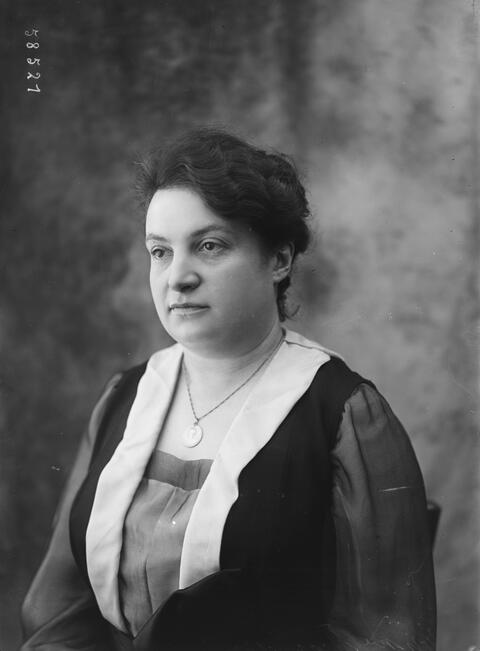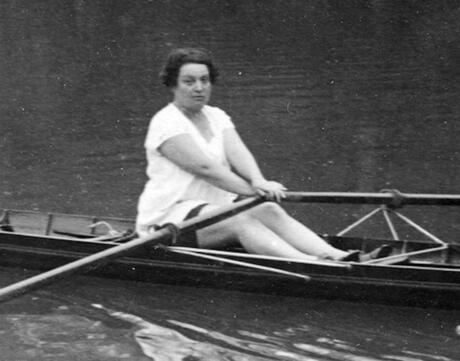Born in Nantes, France, in 1884, Milliat’s passion for sports and her unwavering belief in gender equality led her on an extraordinary journey that would change the course of history. The remarkable achievements of this exceptional woman include organising the groundbreaking Women’s Olympics in 1922 and establishing the Fédération Sportive Féminine Internationale (FSFI), the first international organisation dedicated to promoting women’s sports. Unfazed by the challenges she faced, her legacy is inspiring generations of women to pursue their athletic dreams and redefine the boundaries of possibility.
Portrait of Alice Milliat 1920, president of the Federation of Women's Sports Societies of France.

Portrait of Alice Milliat 1920, president of the Federation of Women's Sports Societies of France.
Milliat’s early life and influences
Alice Milliat was born in Nantes, France in 1884. From an early age, she was passionate about sports and showed great athletic ability. However, the societal norms of the time were not supportive of women in sports. This did not stop her. Instead, she used these barriers as motivation to create change.
Faced with the lack of opportunities for women in sports, Milliat refused to accept the status quo and developed an unwavering determination to break down the barriers that hindered women’s participation in sports. She became a trailblazer, envisioning a world where women could pursue their athletic dreams without constraint, and where their strength, skill and passion would be celebrated and nurtured. This vision became the driving force behind her lifelong dedication to promoting and developing women's sports, setting the stage for her groundbreaking achievements in the years to come.
Milliat's accomplishments in the world of sport
Milliat recognised the transformative power of sports in empowering women and fostering their personal growth. An accomplished athlete, she excelled in various disciplines, including cycling, swimming, and hockey.
But it wasn’t just her athletic pursuits that made Milliat so remarkable. She was also a prolific writer and publisher, using her platform to advocate for women’s rights and opportunities in sports. Through her publications, she challenged societal norms and preconceptions that limited female participation in sports. Her words inspired women around the world to pursue their athletic dreams.
Milliat's most significant achievement was the organisation of the first Women's Olympics in Paris in 1922. 20,000 people gathered in Pershing Stadium to watch 77 athletes compete. This event was a turning point in the history of women's sports. The Women's Olympics were a powerful statement against gender discrimination and led to the inclusion of women's events in the Olympic Games.
Lesson on the Treatment of Edwardian Women
Students examine various resources, including excerpts from Emmeline Pankhurt’s ‘Freedom or Death’ speech, to gain an understanding of how women were treated and expected to behave in Edwardian society.
The founding of the Fédération Sportive Féminine Internationale (FSFI)
In 1921, Alice Milliat’s vision took a giant step forward with the founding of the Fédération Sportive Féminine Internationale (FSFI), the first international organisation to promote women’s sports. Milliat served as the FSFI’s president from 1921 to 1936. The organisation was created to challenge the societal norms that limited women’s participation in sports and to provide opportunities for women to compete internationally.
Despite their groundbreaking efforts, Milliat and the FSFI faced numerous challenges in their pursuit of gender equality in sports due to widespread sexism and discrimination. As women, they were often dismissed and not taken seriously as sports administrators and advocates. They were ridiculed, criticised, and even attacked by men and women who believed that women had no place in sports.
Another significant obstacle was the lack of recognition and support from male-dominated sports organisations. At the time, women's sports were largely marginalised and considered inferior to men’s sports. The prevailing attitude was that women were physically and mentally incapable of competing in sports at the same level as men. This lack of recognition and support made it difficult for Milliat and the FSFI to organise events and secure funding for women’s sports.
Resistance was also met from some women who held traditional views on femininity. During the early 20th century, societal expectations dictated that engaging in sports was often seen as unladylike and inappropriate for women.
Overcoming these societal barriers required extraordinary determination, resilience, and unwavering commitment from Milliat and her colleagues. Their persistence laid the foundation for the eventual inclusion of women’s events in the Olympic Games and has inspired countless women around the world to pursue their athletic aspirations. Their legacy is a testament to the ongoing struggle for gender equality in sports and the necessity of challenging societal norms and biases.
Milliat and the modern day Olympics
100 years on, this summer’s 2024 Paris Olympics are expected to be the first with as many female athletes as male ones.
The International Olympic Committee has turned equity into a mission in recent years, but not all events are equal at the Olympics and many have only recently been updated. The marathon was only extended to include women in 1984, and women’s boxing was not included in the Olympics until 2012.
While great strides are being made, the environment and support staff around athletes continues to be male-dominated. The coaches, the judges, the federations are still mostly male.
Women across sports, around the world, are still fighting for access, pay, and even the way they can dress. People like Alice Milliat need to be recognised and celebrated. She is a role model, and her work is not yet finished.




